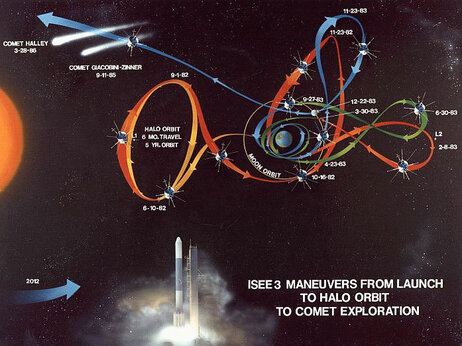Amazing what they got right in 1986. But before I get to the
amazing part some history background .... with links to the original source.
1978
A state of the art satellite, called the International Sun/Earth Explorer 3 was
launched on the 12th of August the 1978. The satellite was to
explore the interaction between the earth’s magnetic field and the solar wind.
It completed this mission in 1982. (link)
1982
It was then renamed International
Cometary Explorer (or ICE) and sent on a new mission. After a thrusters burn
on the 1st of September 1982 and making a series of lunar orbits for
the next 15 months the little space craft, using the gravity or the moon and
earth, was set in a heliocentric orbit ahead of earth. (This is a orbit around
the centre of our solar system ... thus around our sun).
To me this is somewhat amazing .... and the real amazing
part is still yet to come...
They ... and it sounds like Bob Farquhur was the brains
behind it ... did all these manoeuvres over the 15 month period so that the
satellite got to its orbit with the least amount of fuel spent.
(link)
The previous 15 months of manoeuvres allowed the space craft, in its heliocentric orbit, to fly through the plasma tail of Comet Giacobini-Zinner on 11 September 1985
(link)
1986
In March of 1986 it also passed through the tail of Halley’s
comet.
(link)
1991
In 1991 NASA approved what was to be this satellites last
mission. It was to investigate the coronal mass ejections, and cosmic rays.
(link)
1997
On the 5th of May 1997 NASA ended the ICE
mission, and ordered the probe to be shut down except for the carrier signal
left operating.
As of January 1990, ICE was in a 355 day heliocentric orbit around the sun and more or less in the
same orbit path as earth. This means in time to come it would catch up to earth again.
1999
NASA made brief contact with ICE to verify its carrier
signal. 12 of its 13 experiment sensors were still in working order. NASA then
decommissioned the equipment to communicate with the satellite.
April 2014
Almost 15 year after the last contact the satellite is
nearing earth once more and a group of engineers are making a great effort to
recapture the satellite into an halo orbit near earth.
When the guys in 1986 (and Bob Farquhur specifically) set
the course for this satellite they had planned for it to come back to earth ...
and hoped that it can be recaptured.
This little 390 kg satellite has travelled over 24 billion kilometres,
revolved around the sun 27 times, and soon will be close enough to the earth to
be recaptured.
The amazing part is .... To recapture the satellite into its
halo orbit we need the moon. This means that the engineers in 1986 had to make
sure that the moon would be in the right place at the right time sometime in August
2014. And after its 24 billion km of travel, around the sun 27 times, it is out
by a mere 30 000 km. How is that for planning decades in advance! This
also means that the orbit they chose for ICE so many years ago had to co-inside
with where the moon would be. Quoting verbatim from here:
Consider this, the spacecraft has completed almost 27 orbits of the
sun since the last trajectory maneuver. That is 24.87 billion
kilometers. They are off course by less than 30,000 km. I can't even
come up with an analogy to how darn good that is!! That is almost 1
part in ten million accuracy! We need to confirm this with a DSN
ranging, but if this holds, the fuel needed to accomplish the trajectory
change is only about 5.8 meters/sec, or less than 10% of what we
thought last week!
The Reboot Project
Some guys who were part of the Lunar Orbiter Image
Recovery Project (LOIRP) (link - http://www.moonviews.com/mcmoons-aka-building-596/
) project have taken on the challenge with NASA’s blessing to get the satellite
back into working order and get us civilians access to the data. To get this
right they need to fire the thrusters in the next week (more or less before 10
June) to make the small course correction so it can swing around the moon ...
possibly missing the moon service by less than 50 km, can come back into a
stable halo orbit near earth.
I will be following the Reboot project with fascination.
All the details and technical info is over at
spacecollege.org (http://spacecollege.org)
Bob Farquhur
Here there is an article about Bob Farquhur ... and his genius mind at working out these orbits... again quoting verbatim:
Farquhar is now 81 years old. He's been called the master of getting to places. His genius is inventing esoteric flight plans that take advantage of gravitational boosts from the moon and close flybys of Earth to send space probes zipping around the solar system in surprising ways.
He's so adept at calculating these exotic trajectories that often, just for fun, he's made sure that key mission events fall on birthdays or anniversaries.
The exploits of ISEE-3 were the first ones to really show off what Farquhar could do. "Certainly all the people in the space business know that that's my spacecraft. It's very personal with me," he says.
